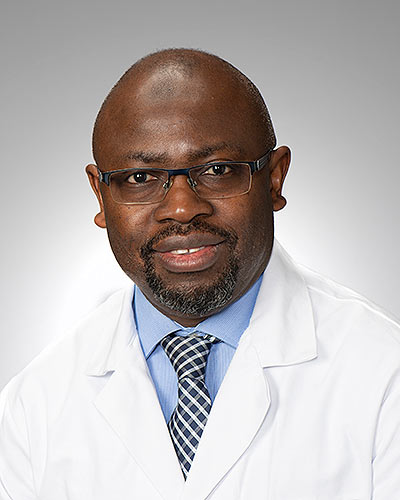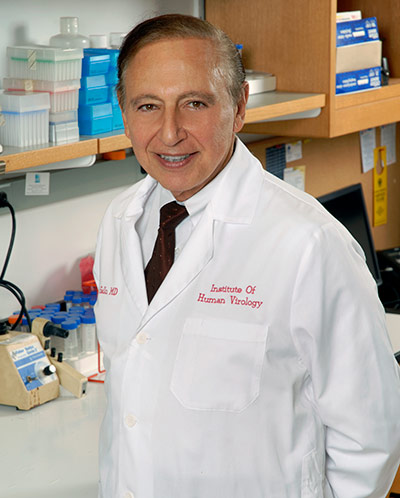July 14, 2020 | Deborah Kotz

Finding Could Lead Pave Way for Expanded Use of Powerful Cancer Drug
Researchers at the University of Maryland School of Medicine (UMSOM) have identified a surprising new mechanism that may significantly expand use of an important cancer drug, called a PARP inhibitor. These drugs are currently only approved to be used in those with certain mutations in the BRCA1 or BRCA2 genes that are associated with breast and ovarian cancers. The new findings were published online last week in the Proceedings of the National Academy of Science (PNAS) journal in collaboration with a group at Johns Hopkins School of Medicine.
In the new study, the investigators determined a chemotherapy drug called Azacytidine (AZA) can cause certain cancer cells that do not have a BRCA mutation to respond very well to therapies that specifically target cells with these gene mutations. They found the drug activates an inflammation pathway that causes the release of inflammatory proteins called cytokines in the tumor cells. This inflammatory response in the cancer cells tricks them into acting as if they have been infected with a virus, a process known as “viral mimicry”. The inflammatory-like signal then directly causes the cancer cells to make a change in DNA damage repair genes. This change causes the cells to resemble those with a BRCA mutation, thus making them sensitive to killing with a PARP inhibitor.
In a previous 2019 study also published in the journal PNAS, the group determined that lung cancer cells given AZA respond to a PARP inhibitor as if they have BRCA mutations, but the underlying causes were not known. “We now understand that the inflammation changes described above directly link to inducing ‘BRCA-ness’ in cells that do not have these mutations,” explained Feyruz V. Rassool, PhD, Professor of Radiation Oncology at UMSOM and a researcher in the Experimental Therapeutics Program of the University of Maryland Greenebaum Comprehensive Cancer Center (UMGCCC).
The above new findings provide further evidence to test whether PARP inhibitors can effectively treat cancer cells without BRCA mutations once they have BRCA-ness induced by AZA. (PARP inhibitors – which block an enzyme that helps repairs damaged DNA in cells -- are currently approved only to treat those cancers with BRCA mutations.)
In fact, the researchers recently helped launched an early phase clinical trial, combining an AZA-like drug and a PARP inhibitor for patients without BRCA mutations who have advanced breast cancer. While the trial is primarily being conducted at Indiana University, the investigator team at UMSOM and Johns Hopkins will evaluate inflammatory processes in tumor biopsies and blood samples from the study patients both before and after treatment.
The new PNAS study was co-authored by Michael Topper, PhD, Instructor of Oncology at Hopkins, UMSOM postdoctoral Fellow Lena Mclaughlin, PhD, and Stephen Baylin, MD, Chief of Cancer Biology at Johns Hopkins University School of Medicine. It was funded by Stand Up to Cancer, a charitable initiative founded in 2008 by nine women in the entertainment industry to accelerate groundbreaking research and bring new treatments to cancer patients as quickly as possible. Funding for the current study was also provided by the National Cancer Institute, NIH and the Adelson Medical Research Foundation as well as the Hodson Trust and the Evelyn Glick Fund.
“Identifying how inflammation is linked to cancer-causing processes is foundational work that has broad implications,” said E. Albert Reece, MD, PhD, MBA, Executive Vice President for Medical Affairs, UM Baltimore, and the John Z. and Akiko K. Bowers Distinguished Professor and Dean, University of Maryland School of Medicine. "This translational research will hopefully lead to exciting new avenues for treatment to improve the lives of cancer patients.”
About the University of Maryland School of Medicine
Now in its third century, the University of Maryland School of Medicine was chartered in 1807 as the first public medical school in the United States. It continues today as one of the fastest growing, top-tier biomedical research enterprises in the world -- with 45 academic departments, centers, institutes, and programs; and a faculty of more than 3,000 physicians, scientists, and allied health professionals, including members of the National Academy of Medicine and the National Academy of Sciences, and a distinguished two-time winner of the Albert E. Lasker Award in Medical Research. With an operating budget of more than $1.2 billion, the School of Medicine works closely in partnership with the University of Maryland Medical Center and Medical System to provide research-intensive, academic and clinically based care for nearly 2 million patients each year. The School of Medicine has more than $540 million in extramural funding, with most of its academic departments highly ranked among all medical schools in the nation in research funding. As one of the seven professional schools that make up the University of Maryland, Baltimore campus, the School of Medicine has a total population of nearly 9,000 faculty and staff, including 2,500 student trainees, residents, and fellows. The combined School of Medicine and Medical System (“University of Maryland Medicine”) has an annual budget of nearly $6 billion and an economic impact more than $15 billion on the state and local community. The School of Medicine faculty, which ranks as the 8th highest among public medical schools in research productivity, is an innovator in translational medicine, with 600 active patents and 24 start-up companies. The School of Medicine works locally, nationally, and globally, with research and treatment facilities in 36 countries around the world. Visit medschool.umaryland.edu
About the University of Maryland Marlene and Stewart Greenebaum Comprehensive Cancer Center
The University of Maryland Marlene and Stewart Greenebaum Comprehensive Cancer Center is a National Cancer Institute-designated comprehensive cancer center in Baltimore. The center is a joint entity of the University of Maryland Medical Center and University of Maryland School of Medicine. It offers a multidisciplinary approach to treating all types of cancer and has an active cancer research program. It is ranked among the top 20 cancer programs in the nation by U.S. News & World Report. www.umgccc.org.
Contact
Deborah Kotz
410-706-4255
dkotz@som.umaryland.edu
Related stories

Tuesday, October 01, 2024
Cancer Patients Who Experience Cognitive Decline After Radiation Treatment for Brain Metastases May Regain Full Neurocognitive Function, New Study Suggests
Nearly 40 percent of cancer patients who experienced memory loss, brain fog and other cognitive difficulties after radiation treatment for brain metastases regained full neurocognitive function within six months, according to a new analysis by radiation oncology researchers at the University of Maryland Greenebaum Comprehensive Cancer Center (UMGCCC).

Monday, October 02, 2023
Internationally Recognized Thoracic Oncologist Dr. Taofeek K. Owonikoko Named Executive Director of the University of Maryland Marlene and Stewart Greenebaum Comprehensive Cancer Center
University of Maryland School of Medicine (UMSOM) Dean Mark T. Gladwin, MD, and University of Maryland Medical Center (UMMC) President & CEO Bert W. O’Malley, MD, announced today that Taofeek K. Owonikoko, MD, PhD, a distinguished physician-scientist with a global reputation in thoracic oncology, has been appointed Executive Director of the University of Maryland Marlene and Stewart Greenebaum Comprehensive Cancer Center (UMGCCC). Dr. Owonikoko will join the faculty of the University of Maryland School of Medicine (UMSOM) as The Marlene and Stewart Greenebaum Professor in Oncology in the Department of Medicine and Executive Director of the UMSOM Program in Oncology. He will also become Chief of Service at UMMC. As the lead Oncologist for both UMMC and UMSOM, he will assume the positions of Senior Associate Dean for Cancer Programs at UMSOM and Associate Vice President for Cancer Programs at University of Maryland, Baltimore (UMB).

Monday, October 31, 2022
NCI Grants Awarded to IHV to Prevent Cancer and Improve Screening in Sub-Saharan Africa
Institute of Human Virology (IHV) researchers at the University of Maryland School of Medicine (UMSOM) have received two five-year awards from the National Institutes of Health’s National Cancer Institute (NCI) for a total of $7.5 million. One award aims to reduce the incidence of lung cancer and other cancers associated with using tobacco in Botswana. The other is focusing on improving screening and treatment of anal precancer in Nigeria. Both grants will make use of existing HIV treatment and prevention infrastructure in low- and middle-income countries to reach people living with HIV who are most at risk for these particular types of cancers.

Tuesday, February 01, 2022
Study: Losing Excess Weight in Adulthood Reduces Risk of Developing Polyps that can Lead to Colorectal Cancer
Weight loss for adults, particularly those who are overweight or obese, may reduce their risk of developing a type of polyp that can lead to colorectal cancer, according to a new study led by researchers at the University of Maryland School of Medicine (UMSOM). Findings were published today in the journal JNCI Cancer Spectrum.

Friday, October 11, 2019
New Treatment Combination Could Work Against Broader Array of Cancer Cells, Study Finds
In continuing efforts to find novel ways to kill cancer cells, researchers at the University of Maryland School of Medicine (UMSOM) have identified a new pathway that leads to the destruction of cancer cells. The new finding, published this week in the journal PNAS, could pave the way for the broader use of a class of anticancer drugs already on the market. These drugs, known as PARP inhibitors, are currently approved by the FDA to treat only a limited group of breast and ovarian cancers associated with BRCA gene mutations.

Wednesday, May 10, 2017
How Cancer Turns a Good Protein Into A Double Agent
Under normal conditions, the CHD4 protein is helpful: it stops cells from transcribing faulty DNA, thereby eliminating potential mutation. However, in colon cancer and perhaps other kinds of cancer as well, it appears that this protein becomes a kind of double agent, working for the enemy.

Tuesday, October 11, 2016
Researchers Identify Novel Mechanism In Combination Drug Therapy For Acute Myeloid Leukemia, Other Cancers
Researchers have discovered a novel mechanism in a combination drug therapy that shows potential as a new approach for treating acute myeloid leukemia (AML) and many other cancers. When combined, these agents cause interactions that significantly disrupt cancer cells’ ability to survive DNA damage, according to a preclinical study published today in the journal Cancer Cell.
